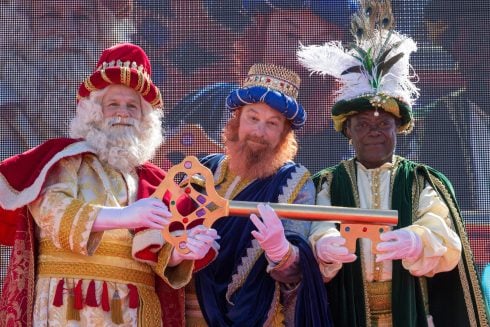To commemorate the 30th anniversary of Groucho Marx’s death, Paul Read travels to Loja to find out why the town was chosen to feature in one of the comedian’s best-known films

VOTED the 60th Greatest Movie of All Time by the American Film Institute, Duck Soup remains one of the great political satires on the senselessness of war and the injustice of the state. The film centres on the ensuing conflict between two dictator states: Freedonia (with Rufus.T. Firefly played by Groucho) and Sylvania (played by the town of Loja in Granada). Released against a backdrop of depression in the US and the rising power of Hitler and Mussolini in Europe, the film was sadly a critical and commercial failure.
Last month, I had the opportunity to ask Groucho Marx – on the 30th anniversary of his death – why he had chosen the town of Loja. We were both looking out over a panoramic view of the town that seemed barely to have changed since the film was shot in 1933.
“And why,” I continued, “had the film been banned in Italy but not in Spain? And when it was shown here, whose idea was it to translate Duck Soup into Sopa de Ganso?” I looked back at the metallic sculpture of Groucho that the town hall had placed here on its new Mirador de Sylvania viewpoint. Groucho remained uncharacteristically silent.
Loja’s promotion of its celluloid alter ego has always left me perplexed. The town now has a new mirador, a yearly short-film festival with a Sylvania award, and an ever increasing number of shops in town that were all exploiting names from the film. But what, I asked Groucho, did anyone really know about the history of the film?
The following day I found myself knocking on the house of Luz-Mari Lopez, one of the sculptors involved in the Marx Brothers silhouettes that adorn the Mirador de Sylvania. She told me she had heard a rumour about American tourists taking photos in the late 1920s.
“Perhaps there is no mystery,” she added, paintbrush in one hand and chisel in the other. “It was just a holiday snap that found its way into Hollywood.” She spat out a half smoked cigarette onto the studio floor and said: “You know, I remember first seeing Sopa De Ganso at the old cinema here in Loja – the Imperial. Each Christmas, the projectionist paused the film as Loja appeared. We would all clap and whistle.”
“Would the projectionist still be alive?” I asked.
“I doubt it. But his son is.”
The following day I sat in a bar not far from the Mirador with a caña, an appetising tapa of fried aubergine and honey, and a projectionist’s son. Jorge not only remembered the 1960s vividly, he looked as though he had just stepped out from them.
“Yes my dad showed the film every year,” he volunteered. “He wanted the whole town to know about Loja´s presence in the American film. He would subscribe to these magazines about films and it was there he found out about Sylvania and Loja.”
“Did he ever find out how Loja came to appear in the film?”
“Back then, the Americans were moving from silent movies to talkies and were sending out producers to film more and more exotic locations. They came and took images of all the towns around here, but of course Loja was picked for the film.”
“Why was that?”
“Because of the image that appears in the film. Look closely and you will see the spire of the Iglesia Mayor huddled up against the remains of the alcazaba. The Christian and the Muslim world just inches apart. There are few skylines like that in the world.”
Better informed, but unconvinced, I left the aubergine with Jorge and went to speak with someone from this century.
In the Department Of Culture, a somewhat serious Juan Alonso Sanchez sat facing me shuffling a pile of papers.
I asked: “What does Duck Soup mean to you?”
“Well, in Spanish Sopa de Ganso means a mixture of fools. Is that what it means in English?”
“Well Groucho said that if you take two turkeys, one goose, four cabbages, but no duck, and mix them together. After one taste, you will duck soup for the rest of your life.”
Juan looked blankly at me. I asked him: “Why do you think Loja appears in the film?”
“There are theories about location hunters and American tourists, but no-one seems really sure. Have you heard the Omar theory?”
“Omar Sharif?”
“No. José Val Del Omar. He was a filmmaker born in Granada, but of Lojeño parents. He was a member of the Generation of 27, a contemporary of Lorca and the inventor of the Zoom Lens.”
He paused for effect. I looked blankly back at him.
“Anyway, it was said that Val Del Omar had a special relationship with Kodak in the US and in exchange for sending them images of Andalucía he received free blank film for his experimental recordings.”
“And one of those images was Loja?”
“It is a theory.”
I lent towards Juan and asked: “Does the town hall know that Sylvania – or Loja – was a petty dictator state prepared to go to war over Mrs Teasdale’s riches?”
“Well…”
“And that Italian dictator Benito Mussolini banned the film from Italy because he thought it was a direct attack on him. Did Franco not feel similarly targetted?”
“Well, it was released during the Second Republic so…”
“But was it shown after the Civil War?”
“I would have thought so as Franco was more concerned with censoring images of sexuality or blasphemy rather than comedy films.”
As I stood up to leave Juan added: “Did you know that in the first script Sylvania was called Amnesia?”
I paused at the door and looked back. “No. But I can see why.”
Juan replied with a blank look.
I strolled back to the Mirador and Los Hermanos Marx. Nothing seemed certain, least of all the various histories of Amnesia. There is a moment in Duck Soup when Groucho considers whether to go to war because his principles have been violated:
“These are my principles,” he says to the Ambassaor of Sylvania. “If you don’t like them, I have others.”
I smiled. Some things were worth remembering. Our political leaders could do a lot worse than listen again to the ramblings of RufusT Firefly.






Didnt know anything about the film – fascinating article. Shall have to visit the town being a Marx Bros fan since childhood. Wa it really Grouch who said those things are his script writers?
Oddly though the “principles” quote doesn’t appear on IMDB.
Would the director of Duck Soup have know that Loja was the home Spain’s first Republican uprising in July 1861 ? This was led by the town blackmsith, Rafael Perez del Alamo, who, backed by 8,000 poorly armed peasants, succeeded in holding on to the town for week. This event has long been recognised as the precedent for the 1st Republic of 1873-75 and the 2nd Republic of 1931-39
Hence, in 1861, Loja was Freedonia for a week !
Guy Thomson